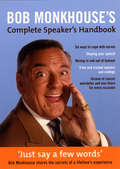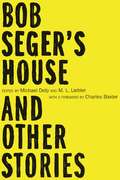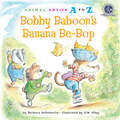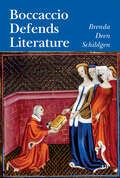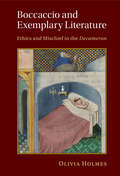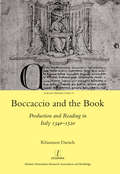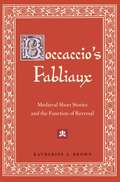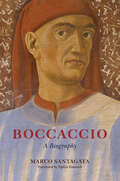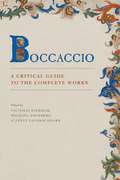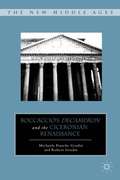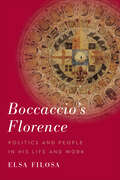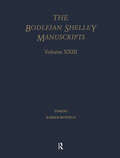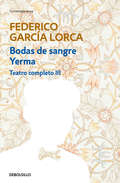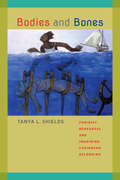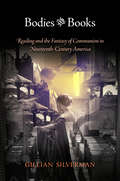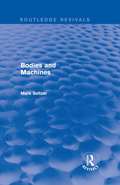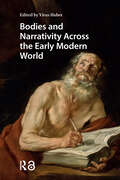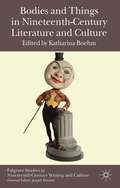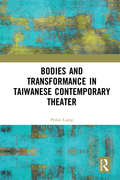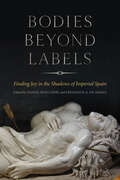- Table View
- List View
Bob Monkhouse's Complete Speaker's Handbook
by Bob MonkhouseDiscover Bob Monkhouse's secrets accumulated from a lifetime's experience in scriptwriting and speechmaking. With his own golden rules, advice and examples from fellow experts and famous friends, and a wealth of humorous material that worked for him, this light-hearted yet thoroughly practical handbook ensures that you will always be ready to say a few words.
Bob Seger's House and Other Stories (Made in Michigan Writers Series)
by M. L. Liebler Michael DelpBob Seger's House and Other Stories is a collection of short stories written by some of Michigan's most well-known fiction writers. This collection of twenty-two short stories serves as a celebration not only of the tenth anniversary of the Made in Michigan Writers Series in 2016 but also of the rich history of writing and storytelling in the region. As series editors Michael Delp and M. L. Liebler state in their preface, "The stories contained in this anthology are a way to stay connected to each other. Think of them as messages sent from all over the map, stitching readers and writers together through stories that continue to honor the ancient art of the fire tale, the hunting epic, and all of the ways language feeds the blood of imagination." The scope of this project reflects the dynamic and diverse writing that is currently taking place by people who consider their home to be the Great Lakes state. Stories are far-ranging, from the streets of Detroit and the iconic presence of the auto industry to the wild tracts of the Upper Peninsula, to a couple on the west coast trying to figure out parenting. The book vibrates with that tension, of metal versus rock and human frailty taking on the pitfalls and hardships of living in this world. In his foreword, Charles Baxter asks, "Does a region give rise to a particular kind of literature? Michigan is so fiercely diverse in its landscapes, its economy, and its population demographics that it presents anybody who wants to write about it with a kind of blank slate. You can't summarize the state easily." These storytellers exude a "Michigan aesthetic" in their writing, something that cannot be learned in a textbook or taught in a classroom but can be felt through the tales of these storytellers. The experience of picking up this collection is akin to taking a drive from the mechanized world and arriving several hours later in one of the wildest places on earth. Readers of short fiction will enjoy the multitude of voices in this anthology.
Bob, Tab, and I
by Cindy Peattie Luisa Soto Fabio LeoneTitle contained within StartUp Phonic Core Program. Not Sold Separately
Bobby Baboon's Banana Be-Bop (Animal Antics A to Z)
by Barbara deRubertisGet to know Alpha Betty&’s class in the award-winning, 26-book alphabet series ANIMAL ANTICS A TO Z! From Alexander Anteater to Zachary Zebra, it&’s one adventure after another. Zip along with these zany characters as they find new friends, test their talents, and have a rip-roaring good time! Bobby Baboon has been busy picking bunches of bananas! He wants to bring the bananas to Alpha Betty's school, but he'll need some help from his buddies along the way! This series is a perfect read-aloud choice to help kids discover the joy of letter sounds and give them the phonics building blocks they need for reading success. With delightful illustrations by Paddington Bear illustrator R.W. Alley, ANIMAL ANTICS A TO Z is an excellent resource for parents and educators alike. Activities in each book plus free activities online add to the fun.
Boccaccio Defends Literature
by Brenda Deen SchildgenIn Boccaccio Defends Literature, Brenda Deen Schildgen contends that Giovanni Boccaccio’s significant contribution to literary history remains underappreciated. The book asserts that Boccaccio refuted the detractors that condemned poetry as immoral, irrational, and even demonic, highlighting instead its aesthetic and cathartic ability to restore equilibrium, provoke thought, and provide solace and entertainment. The book explores how, despite often being dismissed for his morally dubious tales, Boccaccio dedicated himself to defending the legacy of the ancients, endorsing vernacular and secular literature, and cementing the reputations of Dante and Petrarch. It reveals how he forged a wholly new direction for literary prose fiction, driven by his commitment to humanistic studies and admiration for literary achievement. Without moral or spiritual hesitation, Boccaccio asserted that literature – whether pagan or Christian – was an autonomous form of knowledge, a stance he maintained from the 1350s to the end of his life. Contesting the arguments of moralists who sought to ban books, Schildgen demonstrates that Boccaccio advocated for the independence of readers, asserting that they, not writers, bore the responsibility for their responses to literature. Boccaccio Defends Literature thus unveils Boccaccio as a steadfast defender of the enduring relevance of literature.
Boccaccio and Exemplary Literature: Ethics and Mischief in the Decameron (Cambridge Studies in Medieval Literature #120)
by Olivia HolmesThis is the first monograph to provide a comprehensive interpretation of the Decameron's response to classical and medieval didactic traditions. Olivia Holmes unearths the rich variety of Boccaccio's sources, ranging across Aesopic fables, narrative collections of Islamicate origin, sermon-stories and saints' lives, and compilations of historical anecdotes. Examining the Decameron's sceptical and sexually permissive contents in relation to medieval notions of narrative exemplarity, the study also considers how they intersect with current critical assertions of fiction's power to develop empathy and emotional intelligence. Holmes argues that Boccaccio provides readers with the opportunity to exercise both what the ancients called 'Ethics,' and our contemporaries call 'Theory of Mind.' This account of a vast tradition of tale collections and its provocative analysis of their workings will appeal to scholars of Italian literature and medieval studies, as well as to readers interested in evolutionary understandings of storytelling.
Boccaccio and the Book: Production and Reading in Italy 1340-1520
by Rhiannon DanielsAs a new digital era increasingly impacts on the 'age of print', we are ever more conscious of the way in which information is packaged and received. The influence of the material form on the reading process was no less important during the gradual shift from manuscript to early print culture. Focusing on the physical structure and presentation of manuscripts and printed books containing texts by one of the most influential authors of the medieval period, Rhiannon Daniels traces the evolving social, cultural, and economic profile of Boccaccio's readership and the scribes and printers who laboured to reproduce three of his works: the Teseida , Decameron , and De mulieribus claris . Rhiannon Daniels is a British Academy Postdoctoral Fellow in the Department of Italian at the University of Leeds.
Boccaccio and the Invention of Italian Literature
by Martin EisnerGiovanni Boccaccio played a pivotal role in the extraordinary emergence of the Italian literary tradition in the fourteenth century, not only as author of the Decameron, but also as scribe of Dante, Petrarch and Cavalcanti. Using a single codex written entirely in Boccaccio's hand, Martin Eisner brings together material philology and literary history to reveal the multiple ways Boccaccio authorizes this vernacular literary tradition. Each chapter offers a novel interpretation of Boccaccio as a biographer, storyteller, editor and scribe, who constructs arguments, composes narratives, compiles texts and manipulates material forms to legitimize and advance a vernacular literary canon. Situating these philological activities in the context of Boccaccio's broader reflections on poetry in the Decameron and the Genealogy of the Gentile Gods, the book produces a new portrait of Boccaccio that integrates his vernacular and Latin works, while also providing a new context for understanding his fictions.
Boccaccio's Fabliaux: Medieval Short Stories and the Function of Reversal
by Katherine Brown"A remarkably well-informed and truly innovative study of the way Boccaccio reimagined and rewrote Old French fabliaux in his Decameron."—François Rigolot, Princeton University"Theoretically savvy, and yet jargon-free, philologically impeccable and critically acute, this is a book that shows the author’s unflinching dedication to the highest standards of scholarship."—Simone Marchesi, author of Dante and Augustine"Brown’s attention to codicological contexts coupled with persuasive new interpretations of some of the fabliaux and Decameron stories make this book a pleasure to read for medievalist veterans and novices alike."—Renate Blumenfeld-Kosinski, author of Poets, Saints, and Visionaries of the Great Schism, 1378-1417Short works known for their humor and ribaldry, the fabliaux were comic or satirical tales told by wandering minstrels in medieval France. Although the fabliaux are widely acknowledged as inspiring Giovanni Boccaccio’s masterpiece, the Decameron, this theory has never been substantiated beyond perceived commonalities in length and theme. This new and provocative interpretation examines the formal similarities between the Decameron’s tales of wit, wisdom, and practical jokes and the popular thirteenth-century fabliaux.Katherine Brown examines these works through a prism of reversal and chiasmus to show that Boccaccio was not only inspired by the content of the fabliaux but also by their fundamental design--where a passage of truth could be read as a lie or a tale of life as a tale of death. Brown reveals close resemblances in rhetoric, literary models, and narrative structure to demonstrate how the Old French manuscripts of the fabliaux were adapted in the organization of the Decameron.Identifying specific examples of fabliaux transformed by Boccaccio for his classic Decameron, Brown shows how Boccaccio refashioned borrowed literary themes and devices, playing with endless possibilities of literary creation through manipulations of his model texts.Katherine A. Brown is a specialist of medieval French and Italian literature.
Boccaccio's Naked Muse
by Tobias Foster GittesGiovanni Boccaccio (1313-1375) experimented with such a wide variety of genres that critics have tended to focus more on the differences among his works than on their underlying similarities. However, a more comprehensive examination of his corpus reveals that concealed beneath this striking diversity of subject and genre there is a coherent mythology, a virtual catalogue of innovative myths designed to more accurately reflect his cultural experience and better address the needs of his age. Exploring the most significant of these myths, Boccaccio's Naked Muse presents a writer who cast himself as the apostle of a new humanistic faith, one that would honour God by exalting his creation. Tobias Foster Gittes argues that Boccaccio did not simply reproduce Golden Age schemes in his works. Rather, he subtly altered and adapted them in order to produce a model of human beatitude more suited to his conviction that cultural achievement and human dignity are indissolubly linked. Gittes critiques common conceptions of Boccaccio's passivity, or his readiness to speak dismissively of his own work and to cast himself as a victim of vicious critics. Instead, Gittes shows that Boccaccio deliberately assumed this posture of passivity to align himself with a series of martyrs who, like him, had willingly suffered torments in the interest of cultural advancement. By venturing outside the Decameron to the Latin works, and outside the usual textual and intertextual readings of Boccaccio to more broadly cultural and anthropological material, Boccaccio's Naked Muse offers fresh insights on this hugely significant literary figure and his lifelong campaign to transform mythological traditions into a gift for all humanity.
Boccaccio: A Biography
by Marco SantagataA comprehensive biography of the celebrated author of the Decameron, a medieval masterpiece written in early Italian. Boccaccio (1313–75) stands with Dante and Petrarch as one of the “Three Crowns” of Italian letters, a trio of writers who shaped the history of humanism, literature, and poetry. In this book, Dante’s award-winning biographer, Marco Santagata, takes up the moving life and legacy of Boccaccio—whose unflinching story of a pandemic-era community (the Decameron) created new possibilities for vernacular Italian prose. This landmark biography sheds new light on Boccaccio’s life—his family, friends, and foes, his aspirations, fears, and frustrations—and it shows how he was affected by transformations in Italian society. It also charts the influences that shaped Boccaccio’s understanding of literature: what kinds of stories it could tell and what kinds of characters it could depict; and, perhaps most importantly, what role art could play in a changing world. An insightful portrait of one of literature’s most important figures, this book promises to be the definitive biography of Boccaccio for many years to come.
Boccaccio: A Critical Guide to the Complete Works
by Victoria Kirkham, Michael Sherberg, and Janet Levarie SmarrLong celebrated as one of “the Three Crowns” of Florence, Giovanni Boccaccio (1313–75) experimented widely with the forms of literature. His prolific and innovative writings—which range beyond the novella, from lyric to epic, from biography to mythography and geography, from pastoral and romance to invective—became powerful models for authors in Italy and across the Continent. This collection of essays presents Boccaccio’s life and creative output in its encyclopedic diversity. Exploring a variety of genres, Latin as well as Italian, it provides short descriptions of all his works, situates them in his oeuvre, and features critical expositions of their most salient features and innovations. Designed for readers at all levels, it will appeal to scholars of literature, medieval and Renaissance studies, humanism and the classical tradition; as well as European historians, art historians, and students of material culture and the history of the book. Anchored by an introduction and chronology, this volume contains contributions by prominent Boccaccio scholars in the United States, as well as essays by contributors from France, Italy, and the United Kingdom. The year 2013, Boccaccio’s seven-hundredth birthday, will be an important one for the study of his work and will see an increase in academic interest in reassessing his legacy.
Boccaccio’s Decameron And The Ciceronian Renaissance
by Michaela Paasche Grudin Robert GrudinBoccaccio's Decameron and the Ciceronian Renaissance demonstrates that Boccaccio's puzzling masterpiece takes on organic consistency when viewed as an early modern adaptation of a pre-Christian, humanistic vision.
Boccaccio’s Florence: Politics and People in His Life and Work (Toronto Italian Studies)
by Elsa FilosaBest known as the author of the Decameron, Giovanni Boccaccio is a key figure in Italian literature. In the mid-fourteenth century, however, Boccaccio was also deeply involved in the politics of Florence and the extent of his involvement steered and inspired his work as a writer. Boccaccio’s Florence explores the financial, political, and social turbulence of Florence at this time, as well as the major players in literary and political circles, to understand the complex ways they emerged in Boccaccio’s writing. Based on extensive archival research and close reading of Boccaccio’s works, the book aims to recover the dynamics of the Florentine conspiracy of 1360 and how this event affected Boccaccio’s writing, arguing that his works reveal clear references to this episode when read in light of the reconstructed historical context. In this rich and textured picture of the man in his time, Elsa Filosa documents a microhistory of connections and interconnections and offers new, more political and historically imbedded readings of Boccaccio’s seminal works.
Bod XXIII: Indexes to the Bodleian Shelley Manuscripts with Addenda, Corrigenda, List of Watermarks, and Related Bodleian
by Tatsuo TokooGarland's magnificent facsimile series of the manuscripts of Percy Bysshe Shelley and Mary Wollstonecraft Shelley in the Bodleian Library, Oxford ( The Bodleian Shelley Manuscripts , 22 volumes, 1986-1997) is now made complete by the publication of its Index-volume. Volume XXIII provides the key to the contents of the Shelleyan notebooks and papers in all their complexity: poems, prose, translations, fragments, calculations, drawing and doodles, addresses and other miscellaneous jottings. The accumulated findings provide a treasure-trove of information about the Shelley's lives: their writings and readings, and echoes of classical and later authors; the people they met, corresponded with, rented houses from, or saw perform; the towns they visited, the very houses in which they lived, the lakes and rivers they sailed and the mountains they climbed. The intellectual and physical data of these manuscripts will help open new vistas for students of their lives, thought and creative writing.
Bodas de sangre | Yerma (Teatro completo #3)
by Federico García LorcaBodas de sangre | Yerma es el sexto volumen de la Biblioteca Federico García Lorca y el tercero de los que reúnen su «Teatro completo». En este volumen se ofrecen al lector clásicos lorquianos como Bodas de sangre y Yerma. Asimismo, se incluyen conferencias y charlas ofrecidas por el poeta en torno a sus textos, lo que permite una aproximación aún más personal a su obra. La edición y los prólogos, a cargo de Miguel García-Posada, permiten al lector acercarse a la complejidad de su obra y disfrutar, a lo largo de los siete volúmenes que componen esta Biblioteca Federico García Lorca, de uno de los autores españoles más relevantes del siglo XX. «Una de las finalidades que persigo con mi teatro es precisamente aspaventar y aterrar un poco. Estoy seguro y contento de escandalizar. Quiero provocar revulsivos, a ver si se vomita de una vez todo lo malo del teatro actual.»Federico García Lorca --------------------------------------------------------------------------BIBLIOTECA FEDERICO GARCÍA LORCA Poesía competa:1. Libro de poemas | Primeras canciones | Canciones2. Romancero gitano | Poema del cante jondo3. Poeta en Nueva York | Sonetos Teatro completo:4. La zapatera prodigiosa | Mariana Pineda5. El público | Así que pasen cinco años6. Bodas de sangre | Yerma7. La casa de Bernarda Alba | Doña Rosita la soltera--------------------------------------------------------------------------
Bodas de sangre | Yerma (Teatro completo #Volumen 3)
by Federico García LorcaBodas de sangre | Yerma es el sexto volumen de la Biblioteca Federico García Lorca y el tercero de los que reúnen su «Teatro completo». En este volumen se ofrecen al lector clásicos lorquianos como Bodas de sangre y Yerma. Asimismo, se incluyen conferencias y charlas ofrecidas por el poeta en torno a sus textos, lo que permite una aproximación aún más personal a su obra.La edición y los prólogos, a cargo de Miguel García-Posada, permiten al lector acercarse a la complejidad de su obra y disfrutar, a lo largo de los siete volúmenes que componen esta Biblioteca Federico García Lorca, de uno de los autores españoles más relevantes del siglo XX. «Una de las finalidades que persigo con mi teatro es precisamente aspaventar y aterrar un poco. Estoy seguro y contento de escandalizar. Quiero provocar revulsivos, a ver si se vomita de una vez todo lo malo del teatro actual.»Federico García Lorca --------------------------------------------------------------------------BIBLIOTECA FEDERICO GARCÍA LORCA Poesía competa:1. Libro de poemas | Primeras canciones | Canciones2. Romancero gitano | Poema del cante jondo3. Poeta en Nueva York | SonetosTeatro completo:4. La zapatera prodigiosa | Mariana Pineda5. El público | Así que pasen cinco años6. Bodas de sangre | Yerma7. La casa de Bernarda Alba | Doña Rosita la soltera--------------------------------------------------------------------------
Bodies Fins and Stripes (Reach Into Phonics Ser.)
by Deborah J. Short Dee Wallis Kelsey BruceNIMAC-sourced textbook
Bodies and Bones: Feminist Rehearsal and Imagining Caribbean Belonging (New World Studies)
by Tanya L. ShieldsIn Bodies and Bones, Tanya Shields argues that a repeated engagement with the Caribbean’s iconic and historic touchstones offers a new sense of (inter)national belonging that brings an alternative and dynamic vision to the gendered legacy of brutality against black bodies, flesh, and bone. Using a distinctive methodology she calls "feminist rehearsal" to chart the Caribbean’s multiple and contradictory accounts of historical events, the author highlights the gendered and emergent connections between art, history, and belonging.By drawing on a significant range of genres—novels, short stories, poetry, plays, public statuary, and painting—Shields proposes innovative interpretations of the work of Grace Nichols, Pauline Melville, Fred D’Aguiar, Alejo Carpentier, Edwidge Danticat, Aimé Césaire, Marie-Hélène Cauvin, and Rose Marie Desruisseau. She shows how empathetic alliances can challenge both hierarchical institutions and regressive nationalisms and facilitate more democratic interaction.
Bodies and Books: Reading and the Fantasy of Communion in Nineteenth-Century America
by Gillian SilvermanIn nineteenth-century America, Gillian Silverman contends, reading—and particularly book reading—precipitated intense fantasies of communion. In handling a book, the reader imagined touching and being touched by the people affiliated with that book's narrative world—an author, a character, a fellow reader. This experience often led to a sense of consubstantiality, a fantasy that the reader, the material book, and the imagined other were momentarily merged. Such a fantasy challenges psychological conceptions of discrete subjectivity along with the very notion of corporeal integrity—the idea that we are detached, skin-bound, and autonomously functioning entities. It forces us to envision readers not as liberal subjects, pursuing reading as a means toward privacy, interiority, and individuation, but rather as communal beings inseparable from objects in our psychic and phenomenal world.While theorists have long emphasized the way reading can promote a sense of abstract belonging, Bodies and Books emphasizes the intense somatic bonds that nineteenth-century subjects experienced while reading. Silverman bridges the gap between the cognitive and material effects of reading, arguing that the two worked in tandem, enabling readers to feel deep communion with objects (both human and nonhuman) in the external world. Drawing on the letters and diaries of nineteenth-century readers along with literary works by Herman Melville, Frederick Douglass, Susan Warner, and others, Silverman explores the book as a technology of intimacy and ponders what nineteenth-century readers might be able to teach us two centuries later.
Bodies and Machines (Routledge Revivals)
by Mark SeltzerBodies and Machines is a striking and persuasive examination of the body-machine complex and its effects on the modern American cultural imagination. Bodies and Machines, first published in 1992, explores the links between techniques of representation and social and scientific technologies of power in a wide range of realist and naturalist discourses and practices. Seltzer draws on realist and naturalist writing, such as the work of Hawthorne and Henry James, and the discourses which inform it: from scouting manuals and the programmes of systematic management to accounts of sexual biology and the rituals of consumer culture. He explores other mass-produced and mass-consumed cultural forms, including visual representations such as composite photographs, scale models, and the astonishing iconography of standardization.
Bodies and Narrativity Across the Early Modern World (Connected Histories in the Early Modern World)
by Vitus HuberThis book explores the intricate connections between the body and narrative across the early modern world. It examines how bodily aspects shaped the creation of stories and vice versa. The writing, telling, or interpreting of a story is inherently tied to corporeal acts and is, to varying degrees, shaped by them. Likewise, narrativity—the narrative form, including the framing and structuring elements that define a story’s meaning—can influence how the body is experienced, understood, and valued. Adopting an interdisciplinary approach and incorporating case studies from Africa, the Americas, and Europe, this volume positions the body as a critical heuristic tool. It moves beyond the dichotomous debate between constructivism and essentialism by emphasizing the interplay of body and narrative.
Bodies and Things in Nineteenth-Century Literature and Culture
by Katharina BoehmThis book provides fresh perspectives on the object world, embodied experience and materiality in nineteenth-century literature and culture. Contributors explore canonical works by Austen, Brontë, Dickens and James, alongside less-familiar texts and a range of objects including nineteenth-century automata, scrapbooks, museum exhibits and antiques.
Bodies and Transformance in Taiwanese Contemporary Theater
by Peilin LiangIn Bodies and Transformance in Taiwanese Contemporary Theater, Peilin Liang develops a theory of bodily transformation. Proposing the concept of transformance, a conscious and rigorous process of self-cultivation toward a reconceptualized body, Liang shows how theater practitioners of minoritized cultures adopt transformance as a strategy to counteract the embodied practices of ideological and economic hegemony. This book observes key Taiwanese contemporary theater practitioners at work in forging five reconceptualized bodies: the energized, the rhythmic, the ritualized, the joyous, and the (re)productive. By focusing on the development of transformance between the years of 2000–2008, a tumultuous political watershed in Taiwan’s history, the author succeeds in bridging postcolonialism and interculturalism in her conceptual framework. Ideal for scholars of Asian and postcolonial theater, Bodies and Transformance in Taiwanese Contemporary Theater shows how transformance, rather than performance, calibrates with far greater precision and acuity the state of the body and the culture that it seeks to create.
Bodies beyond Labels: Finding Joy in the Shadows of Imperial Spain (Toronto Iberic)
by Daniel Holcombe Frederick A. De ArmasBodies beyond Labels explores moments of joy and joyful expressions of self-identity, intimacy, sexuality, affect, friendship, social relationships, and religiosity in imperial Spanish cultures, a period when embodiments of such joy were shadowed by comparatively more constrictive social conventions. Viewed in this manner, joy frames historic references to gender, sexuality, and present-day concepts of queerness through homoeroticism, non-labelled bodies, gender fluidity, and performativity. This collection reveals diverse glimmers of joy through a variety of genres, including plays, poems, novels, autobiographies, biblical narratives, and civil law texts, among others. The book is divided into five categories: theatrical works that use mythology to enjoy themes of homoeroticism; narrative prose and visual arts that reveal public and private homoerotic expressions; scopophilia within garden and museum spaces that make possible joyous observations of non-labelled and non-corporeal bodies; biblical narratives and epistolary works that signal religious transgressions of gender and friendship; and sexual geographies explored in historic and legal documents. As new generations develop more nuanced senses of gender and sexual identities, Bodies beyond Labels strives to provide new academic optics, as framed by non-labelled bodies, queer theorizations, joy in unexpected places, and the light that has historically (re)emerged from the shadows.
